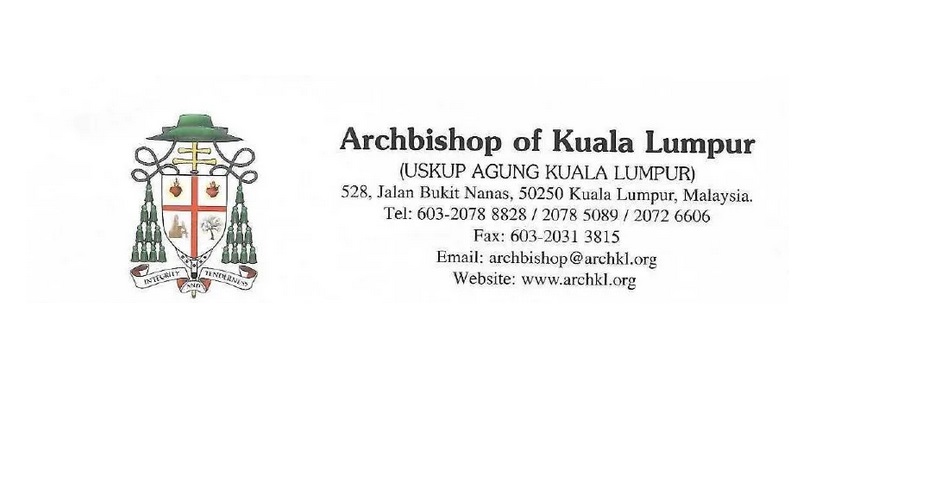Pastoral care of the lay faithful on specific issues in the Archdiocese of Kuala Lumpur
Over the past few years, the clergy has engaged in numerous discussions addressing challenging issues in the pastoral care of the lay faithful.
Apr 25, 2025

Dear People of God,
Greetings of peace and love of Jesus Christ. Over the past few years, the clergy has engaged in numerous discussions addressing challenging issues in the pastoral care of the lay faithful. Embracing a spirit of synodality, we have explored and discerned these matters within the presbyterium, the Council of Priests, and the College of Consultors. It is essential to recognise that collective decisions thrive on the unity of a group. When decisions are made collectively, they foster a stronger sense of commitment and responsibility among all involved. This shared accountability can lead to more effective implementation and better outcomes for the pastoral care of the People of God.
Therefore, the following decisions have been made for implementation in the Archdiocese of Kuala Lumpur:
1. Mixed /Disparity of Worship Marriages and Holy Communion
Pope John Paul II in Familiaris Consortio (1981) wrote, [t]he Eucharist is the very source of Christian marriage. The Eucharistic Sacrifice, in fact, represents Christ's covenant of love with the Church, sealed with His blood on the Cross. In this sacrifice of the New and Eternal Covenant, Christian spouses encounter the source from which their own marriage covenant flows, is interiorly structured and continuously renewed. As a representation of Christ’s sacrifice of love for the Church, the Eucharist is a fountain of charity. In the Eucharistic gift of charity, the Christian family finds the foundation and soul of its “communion” and its “mission”: by partaking in the Eucharistic bread, the different members of the Christian family become one body, which reveals and shares in the wider unity of the Church. Their sharing in the Body of Christ that is “given up” and in His Blood that is “shed” becomes a never-ending source of missionary and apostolic dynamism for the Christian family. (#57)
It has been the pastoral practice in this Archdiocese to celebrate mixed/disparity of worship marriages outside the context of the Holy Mass, unless express permission is sought from the archbishop. The primary purpose of this approach is to ensure that non-Catholic participants do not feel excluded from the celebration, thereby fostering unity.
While we understand that the reason for which the Church reserves the Eucharist outside Mass is, primarily, the administration of Viaticum to the dying, Holy Communion for the sick, and adoration of Christ present in the sacrament, there is also the possibility of Holy Communion outside Mass.
Therefore, after discussing the Rite of Marriage (without Mass) with the couple, at the request of the Catholic partner, the priest can give Communion to the Catholic partner and those Catholics in attendance.
2. Eulogy at Funeral Mass
The General Introduction to the Order of Christian Funerals states that “[a] brief homily based on the readings is always given after the Gospel reading at the funeral liturgy and may also be given after the readings at the vigil service; but there is never to be a eulogy. Attentive to the grief of those present, the homilist should dwell on God’s compassionate love and on the paschal mystery of the Lord, as proclaimed in the Scripture readings. The homilist should also help the members of the assembly to understand that the mystery of God’s love and the mystery of Jesus’ victorious death and resurrection were present in the life and death of the deceased and that these mysteries are active in their own lives as well. Through the homily, members of the family and community should receive consolation and strength to face the death of one of their members with a hope nourished by the saving word of God” (#27).
However, we also recognise that eulogies can provide comfort and facilitate healing during the grieving process, helping individuals embark on a healthy journey of mourning. Therefore, once the funeral Mass has concluded, a family member or friend may deliver a eulogy for the deceased. It is recommended that the eulogy be kept to five minutes or less, with content that is reverent and appropriate in the sacred space of the Church.
3. Permission for Female Altar Servers
In a Pastoral Letter dated November 29, 2019, permission was granted for parishes in the Archdiocese of Kuala Lumpur to include girls as altar servers. While we acknowledge that some parishes may not have been logistically prepared to accommodate both boys and girls at that time, it is my hope that, after five years, all parishes have moved forward to welcome both boys and girls to serve as altar servers.
Let us remember Pope Francis’ words from 2021: “Offering lay people of both sexes the possibility of accessing the ministry of acolyte and lector, by virtue of their participation in the baptismal priesthood, will increase the recognition, also through a liturgical act [institution], of the precious contribution that many lay people make, including women, to the life and mission of the Church.”
May our shared efforts and dedication continue to inspire and support one another as we work towards a hopeful, more compassionate future. Thank you for your unwavering commitment.
Yours faithfully in Christ,
+Most Rev Julian Leow Beng Kim, D.D.
Archbishop of Kuala Lumpur April 8, 2025







Total Comments:0